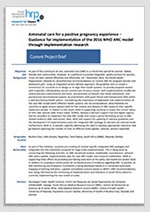Facility assessment of the barriers to access, availability, utilization and readiness of contraception, abortion and post-abortion services in Zika affected areas
HRP Project Brief

Overview
The Zika virus epidemic in Latin America has elicited official recommendations for women to delay or avoid pregnancy in affected countries, which may lead to increase demand for family planning services for spacing and limiting. It is likely, however, that health facilities in affected areas where the population is most vulnerable to the disease lacks the capacity to respond to the increased demand for family planning services. Our objectives are to perform facilities assessment and understand client perceptions in areas affected by Zika virus, and to track changes in these parameters over time.
In collaboration with local health authorities we plan to map facilities that have the capacity to provide services in contraception and safe abortion, including induced abortion to the full extent of the law and post-abortion care for treatment of complications from unsafe abortion and post-abortion contraception. Facilities availability and readiness to provide contraception and safe abortion care services will be assessed. Focus group interviews with clients will be conducted to gain an understanding of the community’s knowledge, needs and perceived barriers to SRH services.
This study will help us identify status of facilities regarding its preparation to respond to the Zika virus epidemic, and those which health systems strengthening is needed. It will also help identify general gaps in services provided and barriers that women, men, and adolescents must overcome to get the care that they need. Lessons learned from this study will help to build health systems that are more prepared to consistently provide reproductive healthcare services in the context of emergencies.
